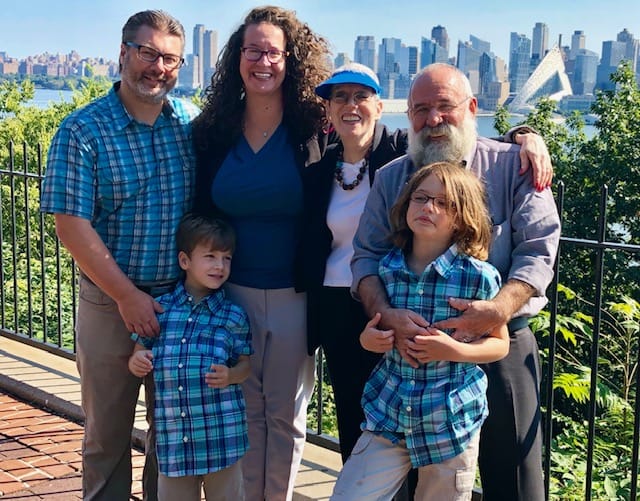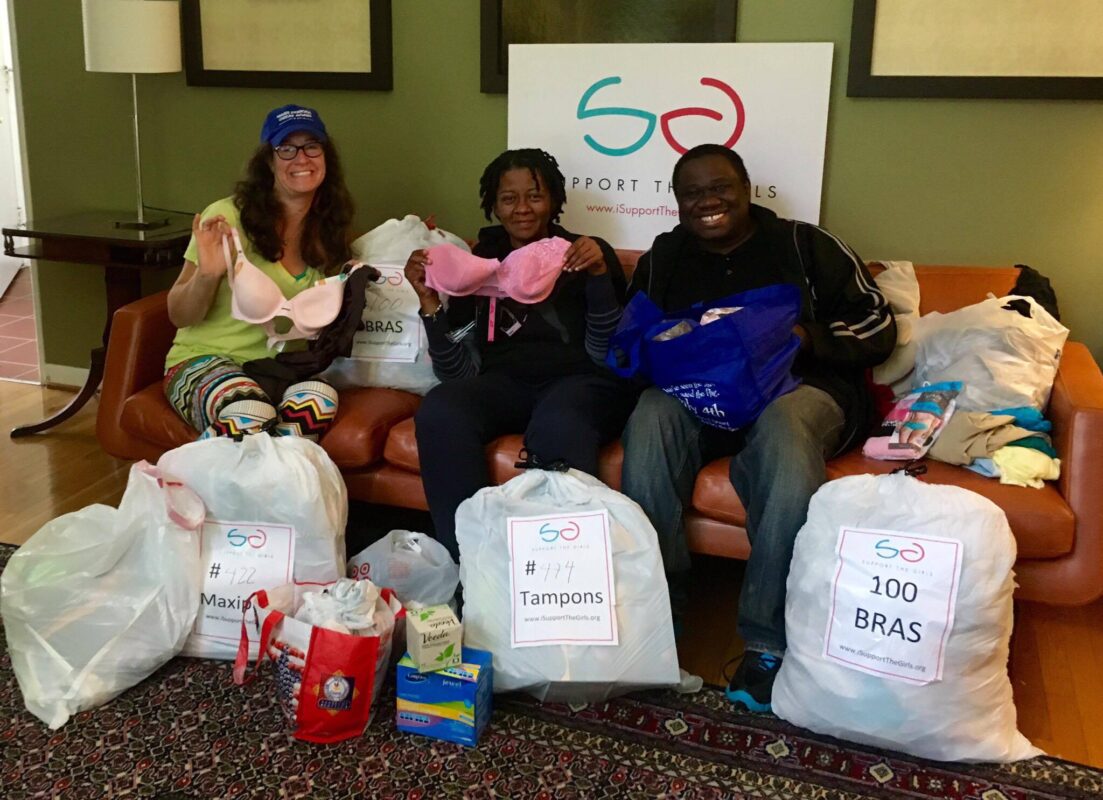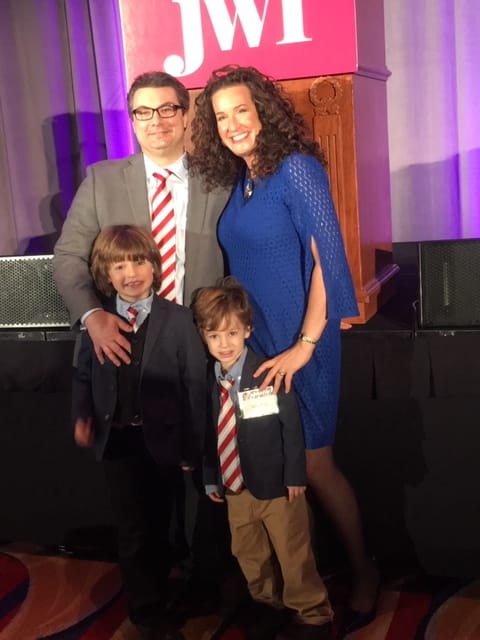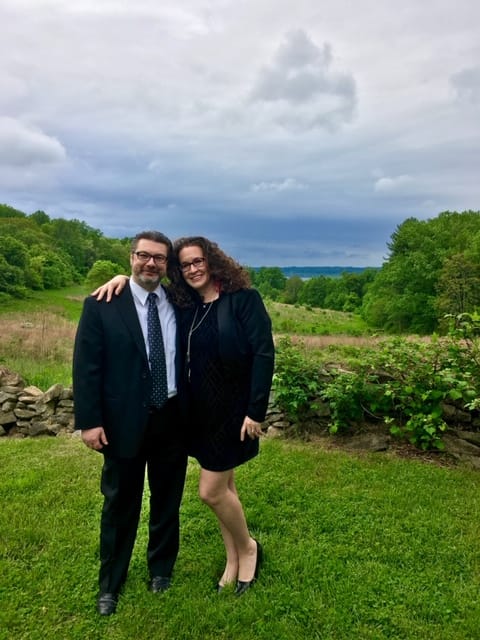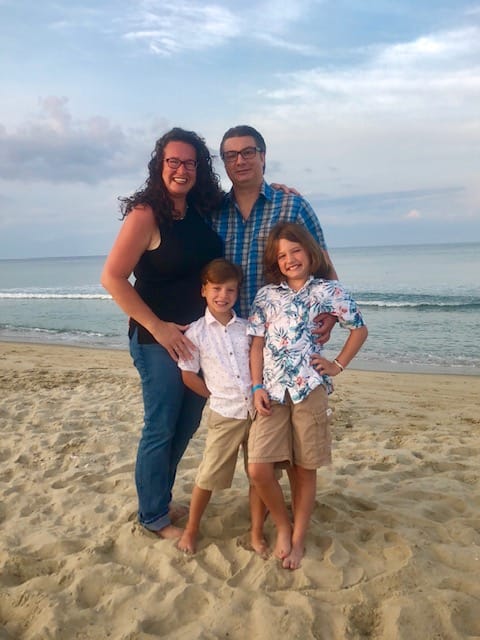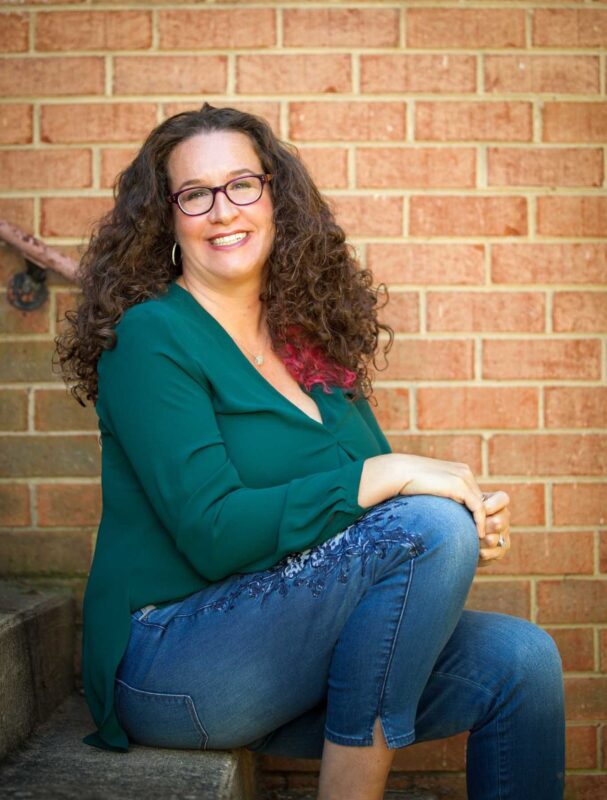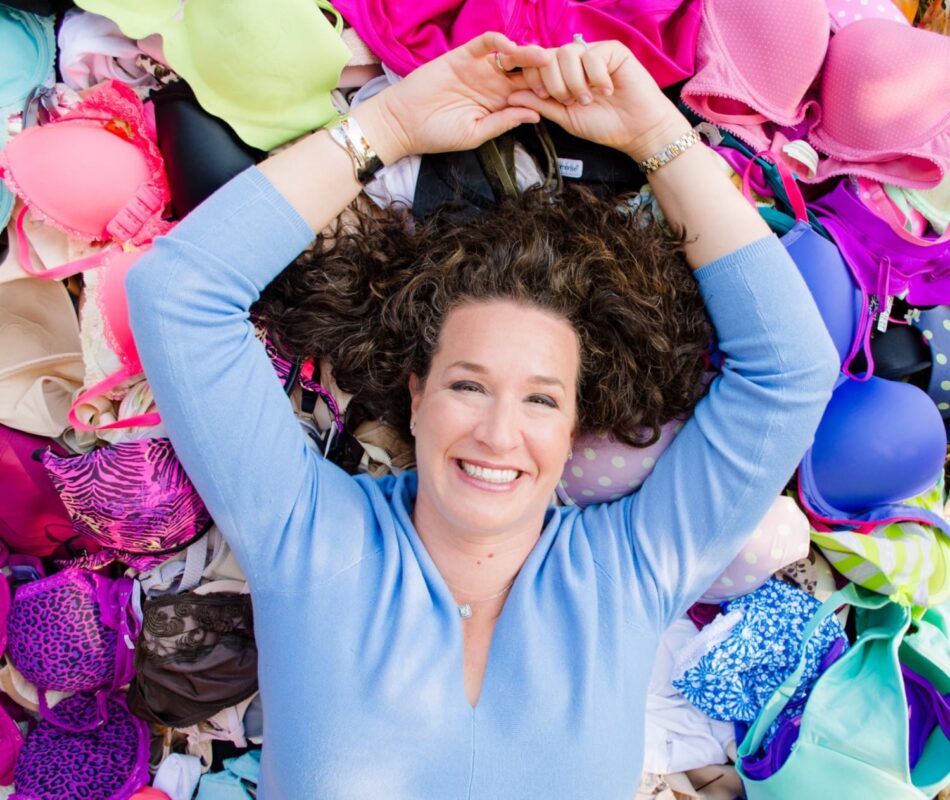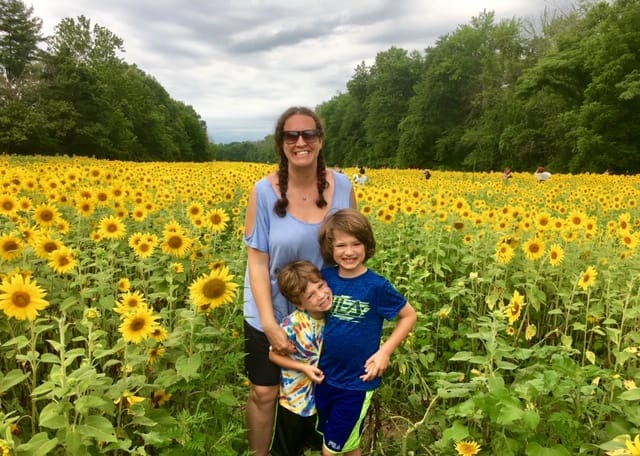Meet Dana Marlowe a social entrepreneur who created a company to make technology accessible to people who have disabilities in the United States, a determined, problem-solver and multitasked woman, a philanthropist who run I Support the Girls, an NGO that collects and distributes essential items for homeless women.
Who is Dana? Define yourself.
If I had to pick a bunch of phrases, I’d say: Determined. Problem-solver. Multitasked par excellence. Feminist. Helper. Loves being a mom. Enjoys rocking out at concerts. Not a fashionista- and I’m very okay with that.
Tell us more about your family, How was Dana as a kid?
I was a friendly, inquisitive dorky kid. Mostly a rule-follower, not a troublemaker. I took school seriously, handed in my homework on time, that sort of thing. I was definitely not super athletic. I was content to hang out with my friends and enjoy life, with the energy that only youths can understand.
You have an Associate of Arts and Sciences (A.A.S.) degree and in Sign Language Interpretation and Translation and also a Bachelor´s degree in Professional & Technical Communication, why did you decide to study these careers?
It’s funny how one encounter of childhood frustration can make a career. As a kid, I attended a summer camp for many sessions. During one session, I met with a fellow camper in my group who was hard of hearing. Like any kid, all I wanted to do was strike up a conversation with her new friend but was unable to do so because I didn’t speak sign language. It was beyond irritating because to me, this girl seemed really nice, and it didn’t seem fair that we all couldn’t communicate with relative ease. Luckily, I had an exciting connection: my Aunt Penny. Before she retired, Penny was a pediatric speech pathologist who also used American Sign Language (ASL) with the children she taught. I scampered to the library for books on sign language and Braille. In just a few short weeks, I somehow launched from talking to my new friend, but to conducting my first official sign language interpretation gig for a vast audience. I even signed the entirety of “We are the World” during the Color War sing competitions.
Fast forward a few years to taking courses at community college and then honing my focus by fusing sign language and communications at Rochester Institute of Technology, getting dual degrees. I wanted to forge a path where I could ensure that people with disabilities had an equitable playing field, so I created Accessibility Partners a few years later. We provide technology consulting to our clients who want to design information technology products that are more accessible and inclusive to people with disabilities.
You have had several jobs in marketing, communications, and events, what did you learn from those jobs? What is the most rewarding aspect of your position in that field?
I’ve learned that communication is essential—whether it is written, verbal, expressed electronically, or in another medium. Access to communication is a human right, and through technology design, that access is either enhanced or hampered. Think about social media, like Twitter or fun sites like YouTube. How are people with disabilities accessing your content compared to someone else without a disability? The most rewarding part of my job is working with clients to help make their products more inclusive to people of all abilities. I love it when they see accessibility as more than a requirement, but as a shrewd design principle that has lasting benefits for years to come.
You founded your own company Accessibility Partners, dedicated to helping organizations implement electronic and information technology accessibility solutions for people with disabilities. Can you describe the services you offer and why motives you to start this project?
Accessibility Partners is about being a social entrepreneur. I view my role as one voice in a chorus to level the playing field in technology. Even now, in 2019, there’s unequal access to technology. Technology is just the norm, and whether it’s an online food ordering website, a social media application, or a large server, there’s often an opportunity to better design and develop it for use by people with disabilities. 1 in 5 Americans identifies as having a disability. Accessibility Partners thrives on providing expert consulting services to government agencies, private corporations, education institutions, and other organizations, to make their technology accessible to that market of almost 60 million people who have disabilities in the United States. Thinking about providing new options for communication and information is what drives me in this data-driven world.
There are a lot of Non-Profit organizations in the world, most of the topics are covered: Aids, cancer, etc but you created I Support the Girls, for the people that don't know what is about, can you elaborate? what did it drive you to do it? how your work has impacted the lives of those homeless?
I Support the Girls has a delightful serendipitous creation. The accidental founding happened when I was getting sized for new bras after a weight loss and made the discovery that homeless women needed bras. Desperately. I set out to donate my old ones, and when I spoke to a nearby shelter, they enthusiastically added they needed menstrual products too. Maxipads just aren’t in the budget and aren’t covered by food stamps for individuals. I didn’t know that in 2015. I figured if I wasn’t aware, then others must not be. I created a quick post on Facebook to collect from friends and family. I added a humble ask to toss in a box of tampons. Well, over three million products donated later, we’ve changed the narrative on bras, menstruation, and a woman’s self-esteem.
Through an international network of affiliates, I Support the Girls collects and distributes essential items, including bras, underwear, and menstrual hygiene products, allowing women experiencing homelessness, impoverishment, or distress to stand tall with dignity. But it’s more than that. It’s reshaping attitudes and perceptions around homelessness and menstruation. We are hopeful that a combination of our donations, coupled with our advocacy efforts will change minds and policies regarding a woman’s basic right to health and dignity.
What do you love most about your job in I Support the Girls ? & what is the most difficult part?
What I love most is the personal stories I hear from either woman who donates to us or we donate to. While often emotional, we hear stories from men who are donating their wives’ bras who have recently passed away, or women who have had mastectomies and no longer need bras. We love how these donations breathe new life into another, and we’ll hear stories about women wearing a properly fitting bra for the first time in months, and feeling professional and empowered at the same time.
The most difficult and challenging part is that we have to deal with a taboo factor around women’s health, equality, and menstruation. Many people get grossed out when topics of menstruation and homeless are brought up. We also had to deal with the fact that while bras are silly and sexy, they are a real need for health and self-esteem needs. It was difficult sometimes to be taken seriously when women’s rights are often not treated with the respect they deserve.
What is the recipe for your success?
Have a great network and don’t expect to know all of the answers. By surrounding yourself with people you trust who are real experts in their skill sets, you can accomplish great things. I think some people are afraid to take the plunge and put faith in others when it is your passion project. But it’s been a resourceful lifesaver for me.
What is the reality of your day-to-day?
My days are incredibly varied. Some days I’m advocating on Capitol Hill for menstrual equity in legislation to abolish the Tampon Tax or advocate that homeless shelters receiving grant money can spend that money on hygiene products. Other days, I’m loading 25 boxes of donations from my local post office into my minivan to sort, clean, and then donate. The reality of my day-to-day is that advocacy isn’t always social media worthy and glamorous—doing the hard work involves a lot of flexibility and energy. The consistent factor is my dedicated staff and volunteers who support our efforts across the country.
Do you have any particular philosophy that guides your career decisions?
My work philosophy is based on 4 foundational beliefs:
1) Find a problem and solve it
2) Find something you enjoy and build it out
3) Trust yourself to get the job done
4) Trust your colleagues
"I have always made sure to surround myself with competent colleagues who I happily delegate work to, whose ideas I want them to implement and their opinions matter to my bottom line. I may be an executive, but I am not an island. I like to let others in".
I am a self-starter and work hard to make sure the job is done well and professionally. However, I have always made sure to surround myself with competent colleagues who I happily delegate work to, whose ideas I want them to implement and their opinions matter to my bottom line. I may be an executive, but I am not an island. I like to let others in.
As an entrepreneur, what is the one thing you do over and over and recommend everyone else do?
I have a great playlist for any time I need a boost. Most of the times it’s Indie Pop, but find the songs that you can just jam to and cruise through the most mundane of tasks.
You have 2 children and a husband, how do you balance your personal and professional life?
The work/life balance is tricky. Well, I’m sure everyone says that, and they adjust accordingly. To paint a picture: I feel like a tightrope walker balancing a bunch of spinning plates on sticks. While I’m up there, I’m hoping that nothing drops or slips through the cracks. Sometimes I’m more coordinated than others. Sometimes I’m sweeping up broken china that my kids didn’t break. Luckily, I’ve found a few hacks that help out. Sometimes, simply adjusting my schedule to accommodate for different needs has helped significantly. I’ve also become quite adept at multitasking. Here’s an example: I’ll pick up a prescription or drop off dry cleaning mid-day on a weekday so that it doesn’t have to get done on the weekend. Then, I might work in the evenings those days to compensate. Thus, my weekends are free from weekday spillover!
Also, if you love what you do, the work/life balance becomes a bit more of a work/life integration. And that “balance” just becomes life. Because I’m passionate about the work I’m doing and I love the career path I have chosen, there is not always the need to draw concrete delineations between “work” and “life”.
What do you like to do in your free time?
I love to stay in motion. I am just about to run a 10-mile road race in Washington DC. Travel invigorates me, and I love sampling new cuisines in foreign countries. I love going to concerts in venues across the DC/Maryland/Virginia area to discover new bands that keep my playlist growing.
What are your plans for this 2019?
I want to get in the advocacy stage more. We are doing very well on product donations (that’s not to say we will turn any generous person away!) but we need to get the awareness of our mission out. There is no reason in 2019 that women should be fighting for access to menstrual products that are priced out of reach or fighting against the perception that they don’t deserve them. We want to appear more publicly to abolish the Tampon Tax officially across the United States, whether through rallies, opeds in newspapers, articles, television interviews, and more. This is an issue that must be brought to light for public policy and minds to change. From this advocacy, we will then work to ensure that schools, prisons, hospitals, and other places of public accommodation have access to menstrual products for those in need without having to worry about the shame in asking.
There is still the glass roof for women in the world: Fewer opportunities, jobs underpaid just for that fact of being a woman, etc. Have you experimented the glass ceiling? if yes, What are the biggest challenges you have faced and how have you overcome them?
The glass ceiling is still intact with nary a crack in it. The wage gap still exists. There are only 24 female CEO’s of Fortune 500 companies. We all know of women who were passed over for a promotion because of their gender. This is where I think feminism- public demonstrations of it- will change public and private opinions. Women are 51% of the U.S. population. We have a voice and we need to be vocal about workforce equality. This could be accomplished via legislation or making sure more people with progressive attitudes are in positions of power. But if we don’t speak up and advocate for ourselves, then who will?
"The glass ceiling is still intact with nary a crack in it. The wage gap still exists. There are only 24 female CEO’s of Fortune 500 companies. We all know of women who were passed over for a promotion because of their gender. We have a voice and we need to be vocal about workforce equality. This could be accomplished via legislation or making sure more people with progressive attitudes are in positions of power".
What do you do for getting people involved in I Support the Girls?
Simply engage people around the issues that matter to them and you’ll see: they'll donate money/products/time. They’ll be happy to help!
"Simply engage people around the issues that matter to them and you’ll see: they’ll donate money/products/time. They’ll be happy to help ".
What tips can you give to young girls?
No matter what the other boys and girls are doing, do what makes you happy. If only boys are doing something, say coding or technology classes, be the one who in and breaks things, only to come up with your own idea to make them stronger and better.
I think in your position, many people may have the wrong idea of who you really are (personally), and what do you (professionally), with this idea in mind, what is being Dana and what's not?
I think people may see a suburban mom in a nice neighborhood and just assume that this is a project to make me ‘feel good’ about myself, and one that I have no vested interest in connection. In reality, I have at times had both family and friends experience extreme income inequality or health issues that prevented them from having their basic needs taken care of. It’s not an easy situation at all! And my heart breaks when I think of most Americans being one paycheck away from not being able to pay rent or one medical bill away from declaring bankruptcy.
That’s my network too. So yes, this looks good in article format and in videos, but it’s also personal to me. I’d still be donating without the press because a woman has a right to dignity, no matter her situation.
Who is the woman you admire the most and why?
My biggest personal inspirations and heroes are from various times throughout history, but they include Harriet Tubman, Madeline Albright, and J.K. Rowling. All powerful women who looked injustice and unfairness in the face, and made their mission their own.
Name: Dana Marlowe
Sector: NGO (Non-governmental organization)
Company: I Support the Girls
Designation: Founder and Executive Director
Country: The United States
Social media:
Personal: Facebook.com/danamarlowe
Twitter: @DanaMarlowe
Instagram: @DanaMarlowe1
Snapchat: DanaMarlowe
Support the Girls: Facebook/SupportTheGirlsAndWomen
Twitter: @I_Support_Girls
Instagram: @iSupportTheGirls
Snapchat: SupportTheGirls


